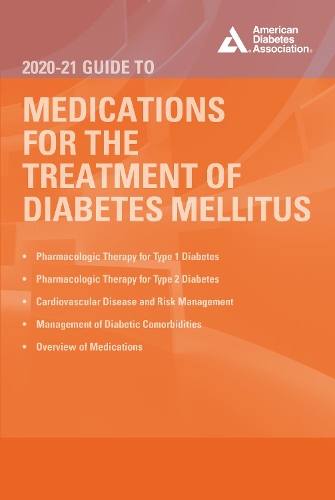
The 2020-21 Guide to Medications for the Therapy of Diabetes Mellitus
(Paperback)
Publishing Details
The 2020-21 Guide to Medications for the Therapy of Diabetes Mellitus
By (Author) John R. White
American Diabetes Association
American Diabetes Association
23rd November 2020
United States
Classifications
General
Non Fiction
616.462
Physical Properties
Paperback
568
Width 152mm, Height 228mm
Description
Newly updated to reflect the latest research and medical guidance, the 2020-21 Guide to Medications for the Treatment of Diabetes offers a bridge between drug handbooks and pharmacology texts.
Focusing entirely on diabetes drugs, this reference is divided into two sections:
- Drugs used to manage hyperglycemia, and
- Management of diabetic comorbidities.
The first section includes:
- Pharmacologic Therapy for Type 1 Diabetes
- Management of Hyperglycemia in Type 1 DM info from practical use of insulin, pathophysiology, treatment strategy
- Insulins: RAIAs, Short-acting insulins, intermediate-acting insulins, LAIAs, Concentrated Insulins, Insulin pumps and patches, inhaled insulins, mixed and mixing insulin, use in Type 1, use in Type 2
- Pharmacologic Therapy for Type 2 Diabetes
- Management of Hyperglycemia in Type 2- brief overview, pathophysiology, treatment strategy, overview of medications
- Biguanides
- TZDs
- SUs
- Glinides
- SGLT-2 Inhibitors
- AGIs
- DPP-IV inhibitors
- GLP Ras
- Amylin mimetics
- BARs
- DA-2 agonists
Each chapter in Section 1 includes:
- Drug class overview and role in diabetes treatment
- Pharmacology: a. Mechanism of action, b. Pharmacokinetics
- Treatment Advantages/Disadvantages: General for the class, b. When applicable, a discussion of evidence that supports the benefits of using a particular drug in a class over another in the same class (eg, Avandia vs Actos)
- Therapeutic Considerations: a. Significant Warnings/Precautions, b. Special Populations, c. Pharmacogenomics, d. Adverse effects and monitoring, e. Drug Interactions, f. Dosage and administration
- Table with Doses and Dose Adjustments
- List of important combination products
- References
The second section includes:
- Cardiovascular Disease and Risk Management
- Microvascular Complications and Foot Care
- Medications for the Management of Hypertension
- Medications for the Management of Hyperlipidemia
- Antiplatelet Therapy
- Medications for Smoking Cessation
- Medications for the Management of Neuropathy (peripheral and autonomic)
- Medications for the Management of Nephropathy
- Medications for the Management of Retinopathy
- Medications for the Management of Depression
- Medications for the Management of Hypoglycemia
- Medications for the Management of Obesity
- Immunizations in Patients with Diabetes
Each chapter in Section 2 includes:
- An overview of the condition or problem
- Goals of treatment
- Overview of the medications and rationale for the medications used for the problem
- Overview of each class of medication
- Overview of combination therapy: a. first combination, b. second combination
- Doses and Dose Adjustments for the more salient medications
- List of important combination products
- References
Author Bio
John R. White, Jr., PA-C, PharmD, is Chair and the R. Keith Campbell Distinguished Professor in Diabetes Care of the Department of Pharmacotherapy at the Washington State University College of Pharmacy. Dr. White is the author of three books, 29 book chapters, and more than 150 manuscripts on diabetes medications. In addition to his teaching responsibilities at the university, he is a sought-after speaker and has given over 330 lectures at domestic and international conferences. He has been on the editorial boards of many diabetes-related scholarly journals and is currently Associate Editor of Clinical Diabetes.
